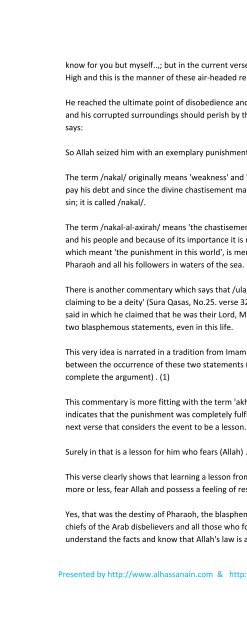Download Here - Islamic Books, Islamic Movies, Islamic Audio, All ...
Download Here - Islamic Books, Islamic Movies, Islamic Audio, All ...
Download Here - Islamic Books, Islamic Movies, Islamic Audio, All ...
Create successful ePaper yourself
Turn your PDF publications into a flip-book with our unique Google optimized e-Paper software.
know for you but myself..,; but in the current verse he goes further and says: I am your Lord, Most<br />
High and this is the manner of these air‐headed rebels.<br />
He reached the ultimate point of disobedience and deserved the most painful punishments. He<br />
and his corrupted surroundings should perish by the order of <strong>All</strong>ah that is why, in the next verse, it<br />
says:<br />
So <strong>All</strong>ah seized him with an exemplary punishment in the <strong>Here</strong>after and in this life.<br />
The term /nakal/ originally means 'weakness' and 'disability', so it is said of a person who fails to<br />
pay his debt and since the divine chastisement makes people weak and stops others from doing<br />
sin; it is called /nakal/.<br />
The term /nakal‐al‐axirah/ means 'the chastisement of the <strong>Here</strong>after' which will envelop Pharaoh<br />
and his people and because of its importance it is mentioned first and the term /ula/ 'former life'<br />
which meant 'the punishment in this world', is mentioned second and is that which destroyed<br />
Pharaoh and all his followers in waters of the sea.<br />
There is another commentary which says that /ula/ means 'the first word that Pharaoh said<br />
claiming to be a deity' (Sura Qasas, No.25. verse 32) , and 'axirah' refers to the last word that he<br />
said in which he claimed that he was their Lord, Most High. Then, <strong>All</strong>ah punished him for these<br />
two blasphemous statements, even in this life.<br />
This very idea is narrated in a tradition from Imam Baqir who added that 40 years had elapsed<br />
between the occurrence of these two statements (meaning that <strong>All</strong>ah did not just punish him to<br />
complete the argument) . (1)<br />
This commentary is more fitting with the term 'akhaza' which is a verb in the past tense, and<br />
indicates that the punishment was completely fulfilled in the present world. and also with the<br />
next verse that considers the event to be a lesson.<br />
Surely in that is a lesson for him who fears (<strong>All</strong>ah) .<br />
This verse clearly shows that learning a lesson from these events is possible only for those who,<br />
more or less, fear <strong>All</strong>ah and possess a feeling of responsibility in their hearts.<br />
Yes, that was the destiny of Pharaoh, the blasphemer; an example to make other pagans and<br />
chiefs of the Arab disbelievers and all those who follow on the path of Pharaoh, in any age,<br />
understand the facts and know that <strong>All</strong>ah's law is always true, firm and unchangeable.<br />
Presented by http://www.alhassanain.com & http://www.islamicblessings.com














